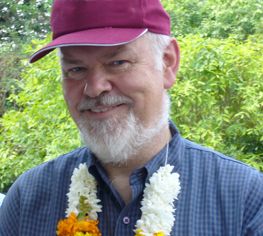|
|
Biography |
|
|
 Norman Uphoff, professor of government and international agriculture at Cornell University in USA, is currently director of the Cornell Institute for Public Affairs, having previously served for 15 years as director of the Cornell International Institute for Food, Agriculture and Development. He has worked on agricultural and rural development issues for over 40 years, starting as an applied social scientist concerned with participatory development strategies, local organizations, irrigation management, and social capital. He has become increasingly involved with agroecological strategies to meet world food needs. For the last 15 years, he has been engaged with the evaluation, understanding and dissemination of the System of Rice Intensification (SRI), an agroecological methodology developed in Madagascar. Its agronomic, economic and ecological advantages have been seen now in almost 50 countries. SRI methods give farmers higher output from their available inputs, not requiring any purchases or loans as SRI proceeds with reduced amounts of seed, water, and fertilizer, and often even of labor. Although SRI has been controversial, its methods are now being promoted by governments in China, India, Indonesia, Cambodia and Vietnam, where most of the world's rice is grown. There are now over 1 million Vietnamese farmers using SRI methods, up from less than 10,000 four years ago. Uphoff's book on BIOLOGICAL APPROACHES TO SUSTAINABLE SOIL SYSTEMS (2006) was written with over 100 authors and co-editors from 28 countries, bringing together the scientific foundations and experiential demonstrations for agroecological production strategies that can promote global food security.
Norman Uphoff, professor of government and international agriculture at Cornell University in USA, is currently director of the Cornell Institute for Public Affairs, having previously served for 15 years as director of the Cornell International Institute for Food, Agriculture and Development. He has worked on agricultural and rural development issues for over 40 years, starting as an applied social scientist concerned with participatory development strategies, local organizations, irrigation management, and social capital. He has become increasingly involved with agroecological strategies to meet world food needs. For the last 15 years, he has been engaged with the evaluation, understanding and dissemination of the System of Rice Intensification (SRI), an agroecological methodology developed in Madagascar. Its agronomic, economic and ecological advantages have been seen now in almost 50 countries. SRI methods give farmers higher output from their available inputs, not requiring any purchases or loans as SRI proceeds with reduced amounts of seed, water, and fertilizer, and often even of labor. Although SRI has been controversial, its methods are now being promoted by governments in China, India, Indonesia, Cambodia and Vietnam, where most of the world's rice is grown. There are now over 1 million Vietnamese farmers using SRI methods, up from less than 10,000 four years ago. Uphoff's book on BIOLOGICAL APPROACHES TO SUSTAINABLE SOIL SYSTEMS (2006) was written with over 100 authors and co-editors from 28 countries, bringing together the scientific foundations and experiential demonstrations for agroecological production strategies that can promote global food security.
|
|
|
|
|
|
|
Abstract |
|
|
|
|
|
|
|
|
|
|
|